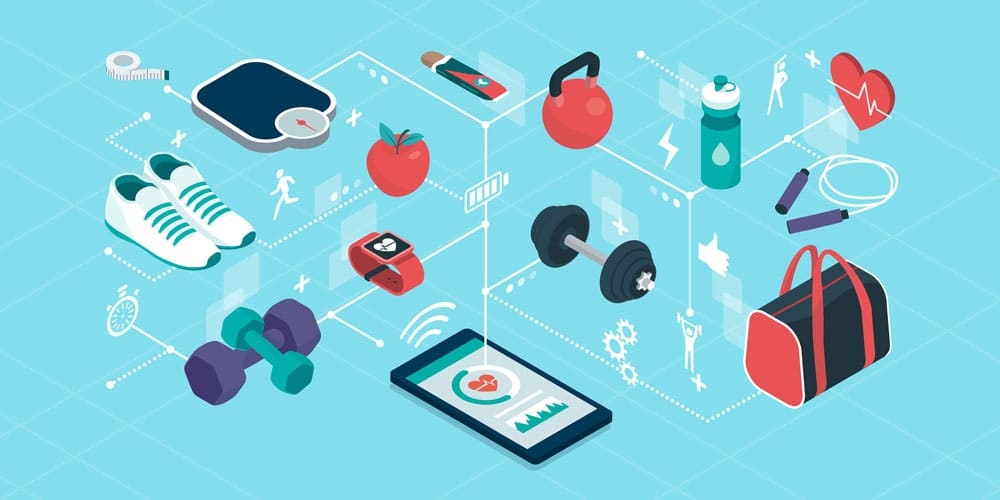By Wesley Gallagher
If movies from the ’90s were right about anything, it was that robots would take over the world, just maybe not in the way they portrayed it. We’ve got almost everything we need now at the tip of our fingers, including personalized nutrition advice.
Advances in nutrition and food technology have led to the development of digital therapeutics: apps and other products that use technology to help people manage their health. These products act almost like pocket nutritionists, providing feedback on diet and offering advice on what to eat. But despite their convenience, the science behind such apps is still new, and the benefits are limited.
How Digital Therapeutics Offer Personalized Help
We’ve all heard of the cure-all diets: Atkins, Whole30, keto … every year it seems there’s a new way to eat that will make everyone feel and look like a million bucks.
We’re still learning what factors into individuals’ nutritional requirements, but what’s clear is that what works for one person doesn’t necessarily work for another.
As it turns out, there really isn’t a one-size-fits-all diet. Whether it’s for weight loss, general health, or treatment of an illness, nutrition should be personalized. According to TIME magazine, even twins have different dietary needs, and the gut microbiome may be a key ingredient in those differences. We’re still learning what factors into individuals’ nutritional requirements, but what’s clear is that what works for one person doesn’t necessarily work for another.
That’s where digital therapeutics come in. While the research in this realm is still new, recently-launched apps use real-time data and analysis to create diets catered to the specific needs of individuals. These apps are programmed with personalized user information and data collected from entire user groups. Their aim is to help people who struggle with conditions like diabetes and obesity manage what they eat on a daily basis for optimal health.

An article in The New York Times details the benefits of combining artificial intelligence and nutrition in apps like DayTwo and ZOE. A man with diabetes, for instance, filled out a questionnaire with his blood sugar, height, weight, and medical conditions, and sent in a stool sample to get his microbiome sequenced. This information was used to create a personalized profile on the DayTwo app, and he continued to log his blood sugar over the coming weeks. Eventually the app was able to tell him what foods were good or bad for his blood sugar, and after a year and a half of using the app, his diabetes was in remission, and he had lost 100 pounds.
Many of these apps require detailed entries of daily food intake and blood sugar measurements, so they do take a bit of work on the part of the user. But the convenience of on-the-go nutrition advice is revolutionary, almost like having a dietitian in your pocket, which is great. Or is it?
Is Combining Artificial Intelligence and Nutrition for You?
Meadows Senior Fellow Kristin Kirkpatrick, the bestselling author and award-winning dietitian, cautions that while combining artificial intelligence and food may work for some, it may not work for everyone.
“I think in a lot of ways, it’s been really helpful because it’s constant accountability,” she says. For the person who mindlessly snacks and needs a reminder to stay out of the pantry, or the list-maker who loves logging meals, an app may be just the thing to keep you on track nutritionally.
But if you are someone who easily becomes fixated on what you’re eating, an app that encourages that fixation may not be the best approach. “I don’t know if a digital therapeutic will foster a better relationship with food,” says Kirkpatrick, who emphasizes that relationship as being the more important goal.
For the person who mindlessly snacks and needs a reminder to stay out of the pantry, or the list-maker who loves logging meals, an app may be just the thing to keep you on track nutritionally.
Kirkpatrick recommends a more intuitive approach to food, which may not jibe well with obsessively logging meals and constant blood sugar level checks. Intuitive eating is based on ten principles, according to Healthline.com and Intuitive Eating’s authors:
- Reject the diet mentality
- Honor your hunger
- Make peace with food
- Challenge the food police
- Respect your fullness
- Discover the satisfaction factor
- Honor your feelings without using food
- Respect your body
- Exercise — feel the difference
- Honor your health — gentle nutrition
These principles buck against the diet culture that touts restrictive diets and calorie-counting. They encourage us to trust ourselves and be more mindful about food. An app, while helpful, isn’t going to change our relationship with food on its own. That’s something we have to work on internally. However, digital therapeutics may be the perfect companion for your journey to wholistic health surrounding food.
If you or someone you know struggles with their relationship with food, we at The Meadows can help. We offer a range of therapies that can be catered to fit your individual needs. Reach out today to see how we can help you on the road to mental, emotional, and physical healing.

